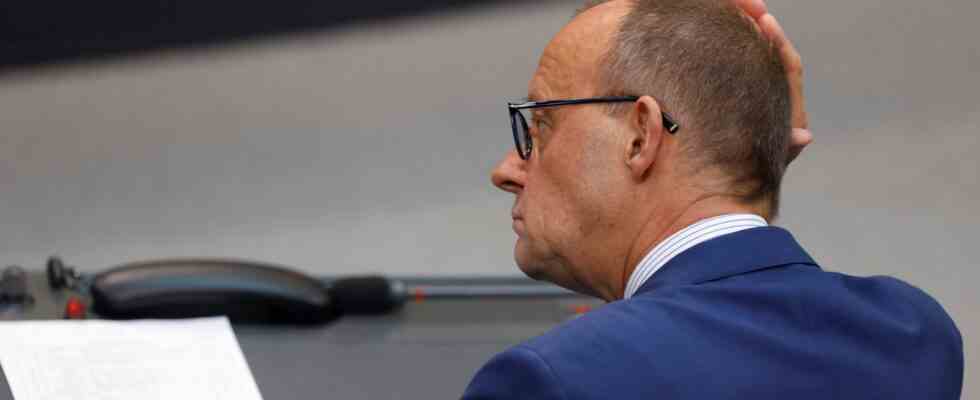As of: 01/21/2023 8:03 p.m
Merz has been leading the CDU for a year. It is not yet clear where to go – and some in the party are strangers to the boss’s choice of words. The CDU knows that it still has a lot to do before the next federal election. The K question is also looming.
A Friedrich Merz does not cry. If so, then it must be a very special moment. Just like on January 22, 2022. When he was elected CDU leader on the third try and wanted to say thank you with tears in his eyes, his voice suddenly broke.
A year has passed since then and Friedrich Merz is the old roughneck. But he also strikes new tones. He is looking for his role, the entire CDU has to find itself again. The party is currently writing a basic program and is looking for answers to the question of how the party stands on the major issues of the time.
Constructive and conservative?
Merz wants to be a constructive opposition, but also show a clear conservative edge. The CDU is not a program party with strong ideological commitments, says the political scientist Ursula Münch, director at the Academy for Political Education in Tutzing. “Especially the public statements made by Friedrich Merz on questions of migration, citizenship and his comments on the Berlin New Year’s Eve riots differ significantly from the corresponding positions of his three predecessors Laschet, Kramp-Karrenbauer and Merkel.” These are indications that he wants to position the CDU a little further to the right of center than before.
At the end of September, an interview on “Bild” TV caused a stir. Merz spoke about Ukrainian refugees and said: “We are now experiencing social tourism from these refugees: to Germany, back to Ukraine, to Germany, back to Ukraine.” He later regretted the choice of words and spoke of “an inaccurate description of a problem that can be observed in individual cases”.
A balancing act
But many do not believe that a political professional like Merz accidentally misinterpreted the tone. In East Germany, the firewall is crumbling to the right. Merz’s announcement that he wants to halve the AfD election results is particularly unrealistic here. Political scientist Münch believes that Merz is complying with the wishes of the party base, but is increasing the distance to liberal-minded elected officials. “So far it’s still working to keep the distance to the AfD on the issue of migration, but that’s a tightrope walk – especially because some of the East German state associations of the CDU even reject this distancing from the AfD.”
Merz and the “little pashas”
After the New Year’s Eve riots and the subsequent debate about alleged perpetrators with a migration background, Merz became clear again. in the ZDF he said: “We are talking about people who actually have no business in Germany.” And then the statement about the “little pashas” in the elementary schools followed: “That’s where it starts.”
Not everyone in the party likes Merz’s choice of words. At the retreat of the CDU board in Weimar, there was also criticism. And General Secretary Mario Czaja also emphasized that sometimes you have to escalate. But it is important to pay attention to the language.
gap in climate protection
The CDU knows that it has to become younger and more feminine. Merz, of all people, has fought for a quota for women, but the road is long. The party also knows that it does not yet have an adequate answer to too many questions of the day. For example in climate protection. That’s not easy to convey with a party leader who likes to take a private plane.
Merz says that Germany must remain an industrial country and accept climate change to some extent. He wants to say that Germany has to adapt, but also do more. He relies less on regulation, even if it doesn’t work without it. Merz promotes free market solutions. He advocates a 360-degree view of energy policy. Also means that nuclear power plants should run longer and that research on nuclear energy should be made possible.
Merz and the K question
What does all this mean for the next federal election? Would Merz be the right candidate for 2025? He is now 67 years old, would he be the right person to embody new beginnings and modernity? Of course, none of this is officially an issue at the moment. He himself would probably answer with a loud “yes” to the question of whether he dared to take up the chancellorship.
But the ARD Germany trend from the beginning of the year does not give him a good report card. Only 29 percent are satisfied with the work of the opposition leader. So maybe another candidate? At the moment it is not a good idea to set up Merz, says political scientist Münch. With him it would be difficult to win the Greens as a coalition partner, which the Union would have to succeed in as things stand. Another argument against this is “that with Friedrich Merz’s candidacy, the Union would signal that it has given up hope of winning over younger and socio-politically liberal voters for the party”.
Günther, Wust, Soder
Two popular prime ministers of the Union in particular are mentioned again and again when it comes to the question of chancellor: the election winners of 2022, Daniel Günther from Schleswig-Holstein and Hendrik Wüst from North Rhine-Westphalia. They are significantly younger than Merz and stand for softer, more forgiving tones. And they both rule with the Greens.
Unlike Merz, they don’t have to prove that the Union can also protect the climate. And then there would be Markus Söder. The CSU boss stood next to Merz when he announced, with a view to the power struggle within the Union for the chancellor candidacy: “Something like 2021 – such an annus horribiles – it will not be repeated.” But doubts remain.

